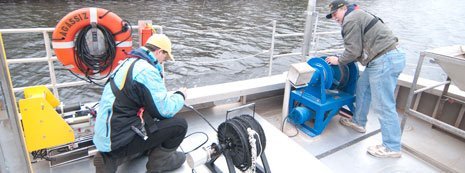Activated carbon-enhanced ozonation of oxalate attributed to HO oxidation in bulk solution and surface oxidation: Effects of the type and number of basic sites
Document Type
Article
Publication Date
2014
Abstract
The objective of this work is to study the influence of the type and number of basic sites of activated carbon (AC) on the AC-enhanced ozonation of oxalate. A commercial activated carbon (AC) was thermally treated with N2, H2, and NH3 at different temperatures. The results of chemical and textural characterization of the original and modified ACs show that the specific surface area and number of basic sites generally increased with increasing treatment temperature, whereas the acidic oxygen-containing groups decreased. Nitrogen-containing groups formed after NH3 treatment. The oxalate removal rate increased in ozonation systems with modified ACs compared with that of systems with the original AC. Oxalate degradation increased when ACs with higher numbers of basic sites and larger specific surface areas were used, except for the AC treated under NH3 at 900 °C. Oxalate removal was attributed to surface oxidation and HO oxidation in bulk solution. The former process was dominant in the ozonation system with 0.2 g/L AC at pH 7. The experimental results indicate pyrrole groups may enhance ozone decomposition to generate HO in bulk solution, while pyridine groups possibly decreased the surface oxidation of oxalate. Other basic sites, such as basal planes and basic oxygen-containing groups, enhanced oxalate removal through surface oxidation, and indirectly weakened HO oxidation of oxalate in bulk solution.
Publication Title
Chemical Engineering Journal
Recommended Citation
Xang, L.,
Xie, Y.,
Cao, H.,
Minakata, D.,
Zhang, Y.,
&
Crittenden, J. C.
(2014).
Activated carbon-enhanced ozonation of oxalate attributed to HO oxidation in bulk solution and surface oxidation: Effects of the type and number of basic sites.
Chemical Engineering Journal,
245, 71-79.
http://doi.org/10.1016/j.cej.2014.01.104
Retrieved from: https://digitalcommons.mtu.edu/cee-fp/3


Publisher's Statement
Copyright © 2014 Elsevier B.V. All rights reserved. Publisher's version of record: https://doi.org/10.1016/j.cej.2014.01.104